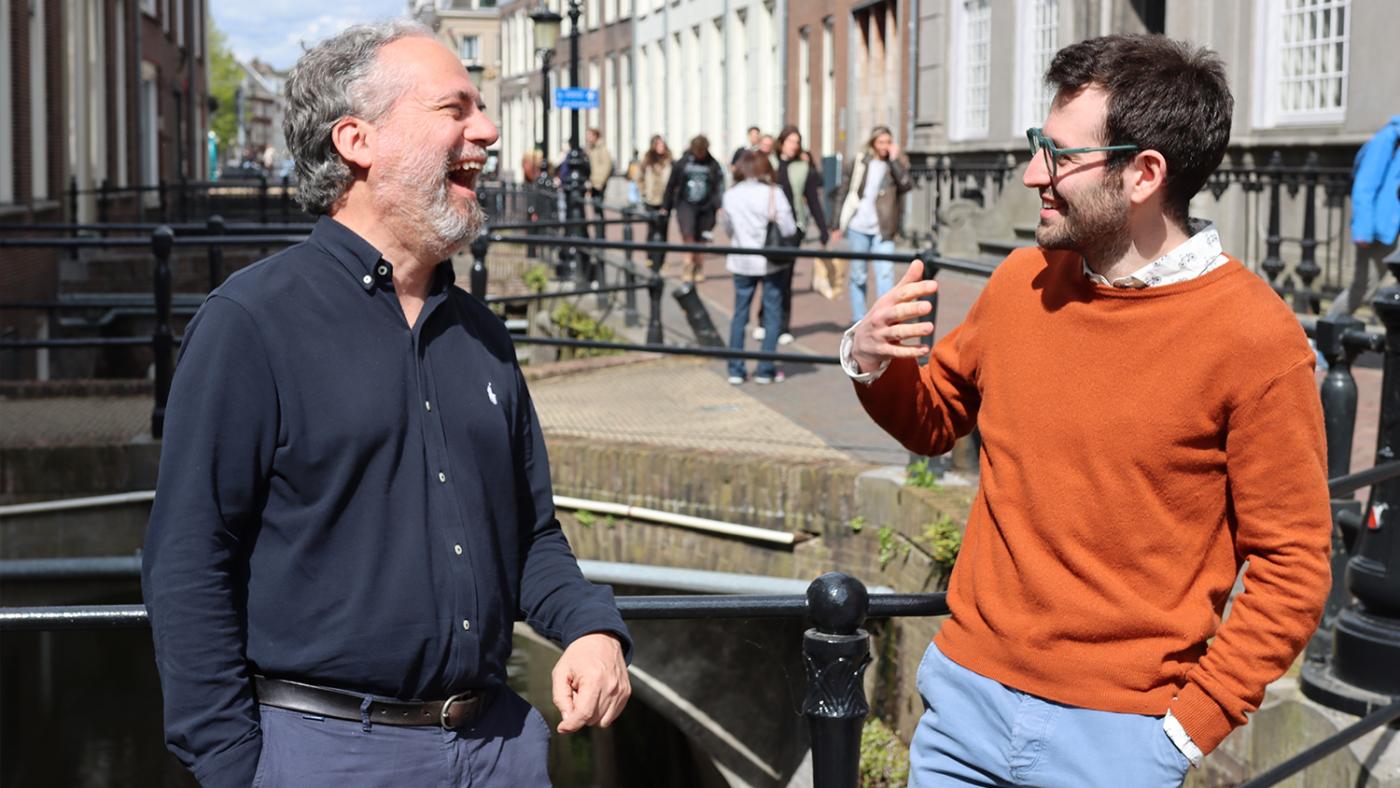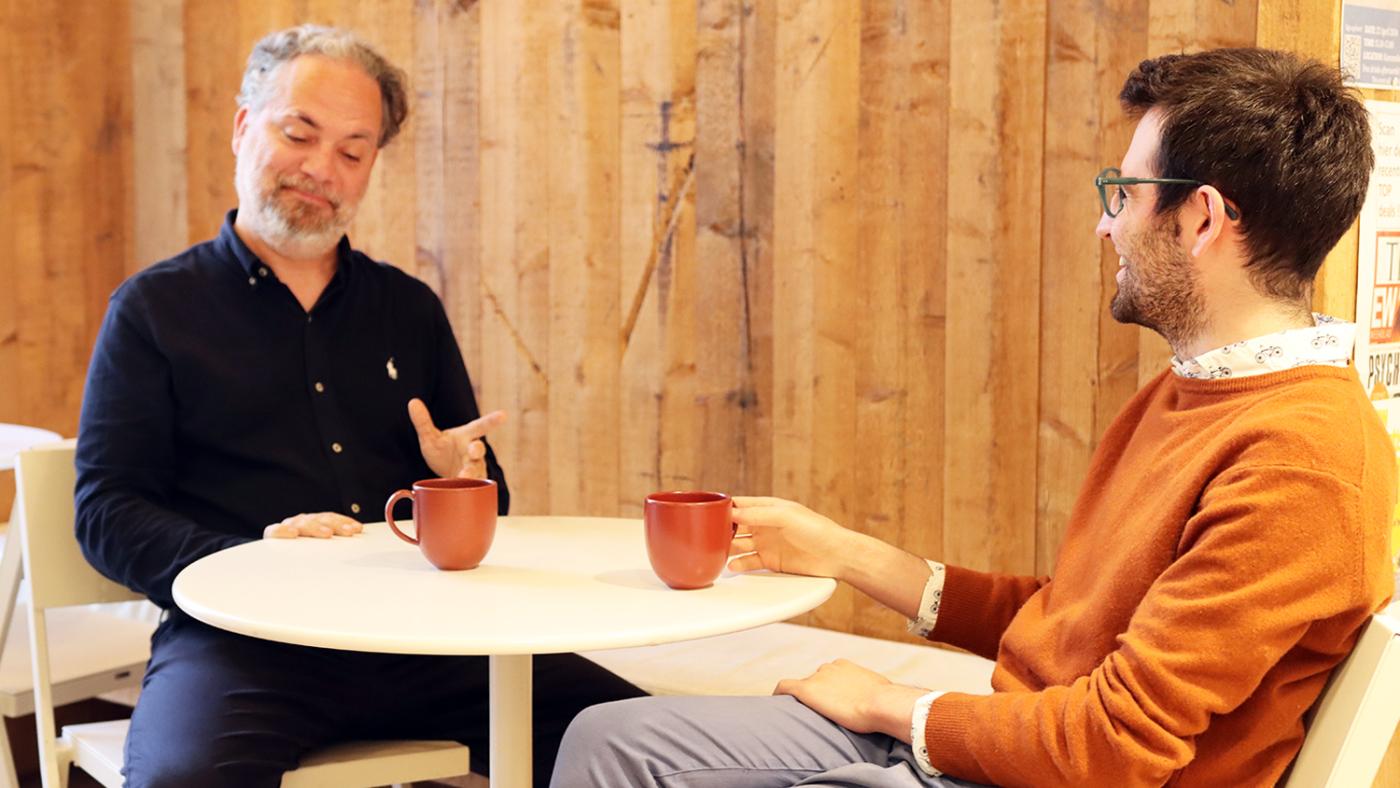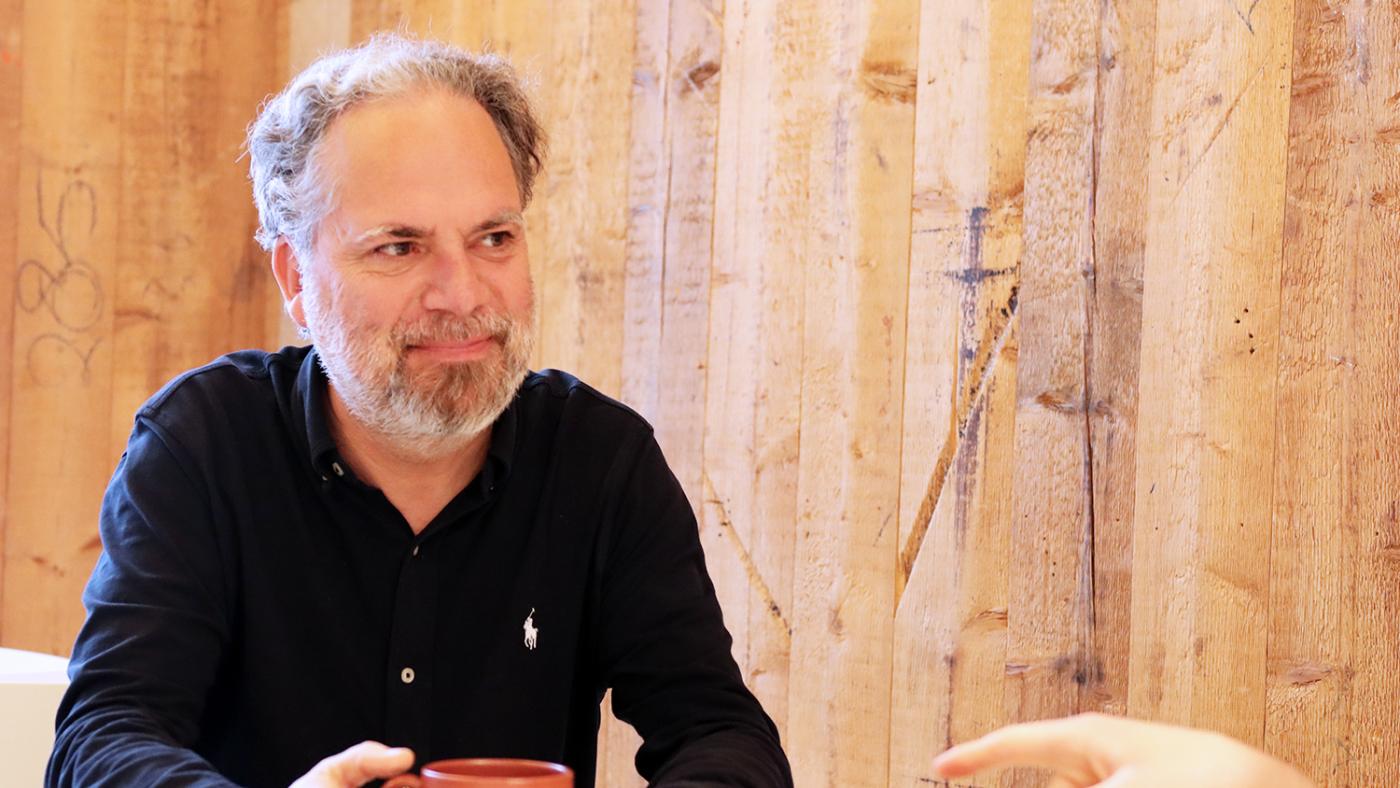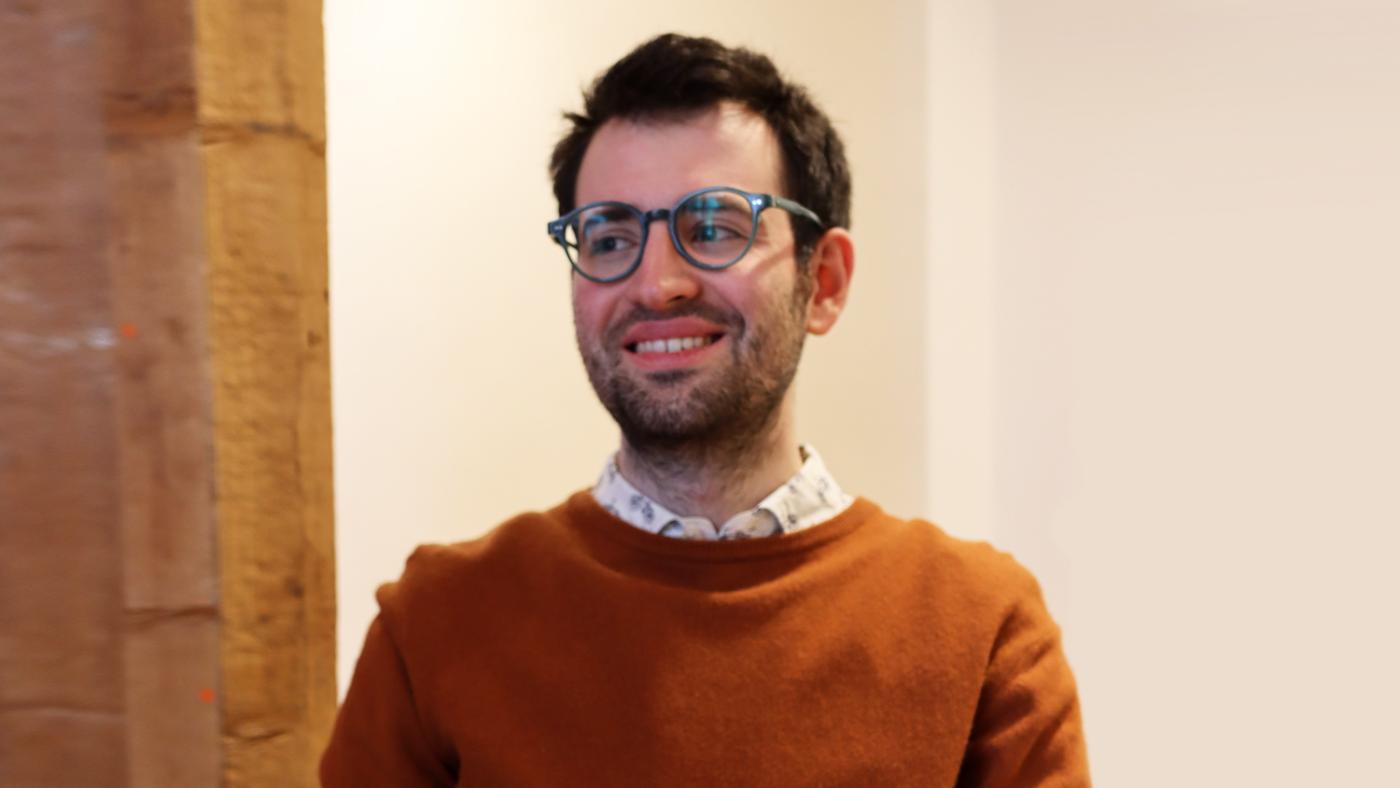Mentorship programme University Pioneers
‘We feel like explorers in the university’

Founded one and a half years ago, University Pioneers is a project aimed at UU students and academics who were among the first in their families to pursue a higher education degree. It provides a space for people with similar backgrounds to come together, which can be a source of comfort and recognition. The mentorship programme is one of many activities University Pioneers organises. It pairs first-generation students with people more experienced with the university. That's how assistant professor David Napolitano (54) and Master's student Ludovico Romagnoli (23) met.
They met for the first time at De Ontdekking Lunchroom, in the city centre of Utrecht, where they had a cup of coffee. Napolitano always takes the initiative to reach out to mentees to schedule their first meeting. After all, meeting someone they don't know, who is higher up on the academic ladder, can be a hurdle for some students, especially considering both mentor and mentee are supposed to open up about their personal lives and share their struggles.

Assistant Professor David Napolitano (54) and Master's student Ludovico Romagnoli. Photo: Irem Zoodsma (DUB)
Napolitano and Ludovico both have an Italian heritage and their chemistry is palpable during the interview – the conversation is passionate and energising. Ludovico started his Research Master’s in Philosophy at UU last September. He came across an Instagram post about University Pioneers (UP), felt spoken to, and immediately applied for the mentorship programme. As for Napolitano, he joined the programme because he was interested in helping people who are new to the university community. He also finds the conversations with mentees inspiring as they often change his perspective on things.
These informal meetings where people “simply” talk about their lives are the essence of the mentorship programme. “This is not a space where I am going to duplicate the study advisor or provide some other type of counselling. The university already has enough tools in that sense. I just try to share my stories, give some advice on how to manage certain situations and, above all, listen to them,” shares Napolitano.
Background
Ludovico decided to study at UU to be part of an international community of Philosophy students and researchers. Born and raised in Bologna, Italy, he identifies as a first-generation student because nobody in his immediate family attended university. An aunt and a cousin are the only ones in his extended family who have gone to college and with whom he can talk about university-related topics. He was surprised when he learned about the UP project. "I had never seen anything like it at the University of Bologna, where I did my Bachelor’s. I know there is a growing movement in academia for first-generation academics. But, as a first-generation student, I think it is even more important to be able to relate to someone. It's quite a big deal, to be honest.”
Napolitano is Belgian-Italian and comes from Overpelt, a village near the Belgium-Netherlands border, where his family owned a pizza restaurant. Today, he is an Assistant Professor in Medieval History, but he took a detour before becoming a university teacher. He worked as a lawyer for fifteen years before finally pursuing his true passion, History, at the age of 35. Being the first in his family to express the wish to go to university, his parents were initially worried about his prospects. In the end, they warmed up to the idea and supported him financially throughout his studies. Under one condition, though: that he would study either Law or Economics, two degrees one is likely to make money with. Once he was able to make his own financial decisions, he returned to university and followed his dream.

David Napolitano. Photo: Irem Zoodsma (DUB)
Informal rules
When speaking with Napolitano and Ludovico, one starts to understand how hard it is to navigate a specific cultural environment while lacking the “expected” cultural know-how – a common feeling among first-generation students. “The university is a community and a community has formal and informal rules of behaviour. You can read the formal rules, but there is no way of finding out what the informal rules are. Without someone helping you, you find out the hard way”, acknowledges Napolitano.
Even though Ludovico possessed all the capabilities to pursue an academic career, he still felt as though he needed to act like a different person on campus. “I come from a suburban middle-class family. Even so, I felt like I didn’t possess the correct cultural baggage to be part of the university. I felt culturally inferior.’’ In hindsight, Ludovico says that people shouldn't feel like they have to learn those ‘’informal rules" at all costs to belong at the university. ‘’University Pioneers and the mentorship programme are not there to provide students with knowledge of those informal rules. Instead, it aims to facilitate conversations about how we can manage situations when we come across these informal rules. At the end of the day, the university is not merely something to adapt to, but an institution first-generation students are also entitled to shape.”
According to Napolitano and Ludovico, instances first-generation students may struggle with include the act of studying itself, since they cannot ask their parents for help. Napolitano recalls failing his first test at Law school because he didn’t know how to study for exams properly. “I didn’t know how important it was to use specific names, jargon and concepts while answering exam questions. One of my teachers offered to help me, and I ended up third in my class at the end of the year. You need somebody to explain to you how to do it’’. Despite these hurdles, Napolitano remarks that first-generation students tend to be very hard-working and independent because they are used to fixing things by themselves.

Ludovico Romagnoli. Photo: Irem Zoodsma (DUB)
Read the room
The mentor’s job is not over when the mentee obtains their Bachelor’s degree. After all, if the mentee decides to pursue a career in academia, informal rules will be more and more prevalent. Napolitano still remembers instances throughout his career where he could not “read the room”, such as when he had to take people out for dinner and opted for "cosy, informal" places. “I have been occasionally frowned upon for my choice of restaurant. People said I needed to entertain the guests and go to restaurants of a higher standard.’’
Ludovico wishes to get a PhD after his Master’s, but he is still trying to figure out the discipline or field. “You can’t just say: 'Okay, I’m really into Philosophy, so let’s apply to a bunch of PhDs around Europe or the world and see what happens. No, first you have to pick a subject or field in advance and tailor your CV towards it. Besides, a lot of knowledge and informal rules are at play when it comes to getting accepted,’’ sighs Ludovico. He and Napolitano often talk about how to go about all these decisions.
Not a homogeneous group
Napolitano discusses a range of other topics with his other mentees as well. “Some students need to talk about forms of discrimination and racism they encounter, while others are more focused on how to cover their finances as they don’t receive any support from their parents”. According to both mentor and mentee, first-generation students cannot be treated as a homogeneous group. “It is a very intersectional affair, various aspects of identity can make you feel out of place as a first-generation student,” according to Ludovico. “People usually associate first-generation students with the lower-middle class, but it is not just about class differences, it can also be about nationality, finances, informal rules and belonging,” explains Napolitano.
Both add that being a first-generation student also comes with an interesting set of advantages. ‘’They are usually the ones who go off the beaten path because they don’t know what the path is. They have to pave the way themselves, which often turns them into innovative people. Being a first-generation student gives you a certain degree of liberty’’, Napolitano observes. He says he was lucky to meet people and teachers who helped him throughout his studies and career. “Now, thanks to University Pioneers, support is institutionalised and anyone who needs it has access to it." Both Napolitano and Ludovico consider themselves explorers navigating new worlds. For them, asking questions such as “What is a university?” and “Which formal and informal rules work and which ones don’t?” makes for fascinating experiences and conversations that ultimately help them feel that they, too, belong at the university.
The programme is still in its infancy. As of now, there are about ninety students who enrolled in the programme. Of which, around forty have had or currently have a mentor assigned and about seventy are in the Community Chat. There are currently 25 mentors/ambassadors but some 60 more are interested to join the programme after recent campaigns. Want to join the programme? Follow this link.